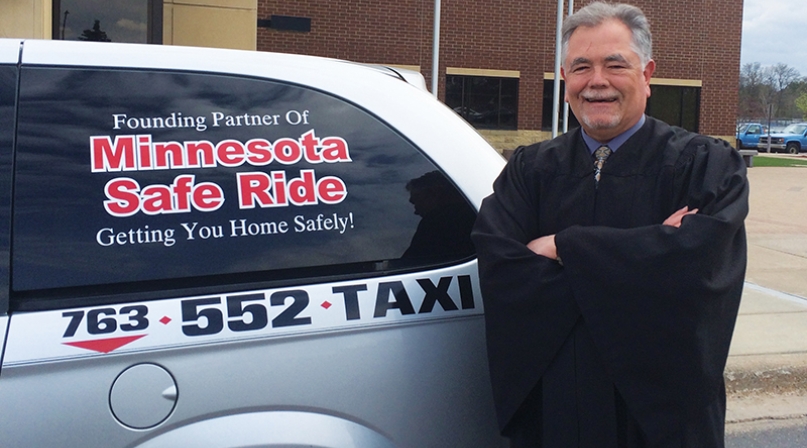Judge spearheads 83 percent drop in DUI cases in rural Minnesota county

Photo Caption: Isanti County Judge James Dehn poses with a Safe Ride cab. Photo courtesy of James Dehn.
It's a tall order to get drunks to check their hubris at the door of a bar and admit they can't drive home, but an Isanti County, Minn. judge has set the stage for just that. With subsidized cab rides home and better-trained bartenders, the rural county has seen an 83 percent reduction in DUI charges in the 10 years since the Safe Cab program debuted in late 2004. "The troubling thing is that before someone is arrested for driv ing under the influence, they've probably done it at least 80 times," said Judge James Dehn. "So there are always places to improve. And we knew where the drunks were coming from." When he started hearing DUI cases in 1997, he interrogated defendants when they pleaded guilty, and he's now above 1,200. Where did they have their last drink? What was it? What was their blood alcohol content? Those answers went into a database that was analyzed by a statistician at the University of Minnesota at Duluth.
The numbers showed an aver age blood alcohol content of 0.171, more than twice the 0.08 legal limit, but 62 percent could be traced back to specific bars. Working with Isanti/Kanabec Toward Zero Deaths, a traffic safety organization, he had a plan.
"I had something to take to the bar owners throughout the county," Dehn said. "I could tell them, 'You've had this many people leave your bar too drunk to drive,' and they were ready to listen."
And he had something else to offer a discount on dram shop liability insurance premiums. Those policies cover bars in case a patron causes an accident, and the 15 percent discount kicked in after they sent their bartenders to additional seller training sessions, to help them identify signs of intoxication and disarm a patron of car keys.
Handling the other side of the problem, getting patrons home, Dehn has put together a pot of money to fund the Safe Cab pro gram, which subsidizes $15 of a cab ride. It's funded by three beer distributors, numerous bars in the area and a collection of private donors. Since it began in 2005, the program has given more than 7,000 rides to 13,000 people.
"If you'd have told me years ago that I'd be able to get beer dis tributors to pay into something like this " Dehn mused. "It's been a real team effort to fund this, and it's been remarkable stewardship for the community on the part of these businesses."
Meanwhile, the professor who was analyzing DUI statistics for Dehn? He hasn't gotten enough data to make a difference for three years.
"He jokes that he feels like the Maytag repairman," Dehn said. "I can't say drunk driving has stopped, but I feel like we've done a lot to cut down on the problem. Maybe we've saved a life. We've definitely proven that even in a small rural community, there are alternatives to driving home drunk."
Isanti County government contributes roughly $2,000 a year to the program, which County Administrator Kevin VanHooser said was an absolute bargain when he figured what the county saves.
"We would spend more than that housing and trying one DUI offender," he said. "There's no way to measure exactly what we would be spending if this program didn't exist."
He praised the bars and distrib utors who pay into the Safe Cabs fund. And he's not the only one.
"It's been so successful because it's a partnership," said Bob Bol lenbeck, coordinator for Toward Zero Deaths. "It goes beyond the cost-sharing, which makes it work in the first place, but the buy-in from the bars and distributors helps change the culture in Isanti County.
"Those businesses are big fans because they're keeping the customers alive and safe, and it's the right thing to do
. "
Bo
llenbeck was skeptical when the first month of the program in late 2004 totaled three cab rides, but soon the numbers climbed and the DUIs dropped.
"In the early 2000s, 10 percent of our population had at least one DUI," he said. "We knew there was a need, we just didn't know if people would make use of the program in time. We don't make any judgments about drinking, we just push people to make good decisions when it's time to go home. We might not have as good of a reception if we tried to push too hard."
The program has expanded to Chisago, Pine, Wright, Kanabec, Ottertail, Sherburne and Rice counties, with ambitions to reach downtown Minneapolis in Hen nepin County.
"It's catching on," Bollenbeck said. "Because it's a rural county, it can be an effort to go get the cars the next morning from the bars, but then the bars' kitchens can do some business selling sandwiches."
Attachments
Related News

Federal judge temporarily halts FEMA disaster mitigation grant program termination
On April 4, the Federal Emergency Management Agency (FEMA) announced it will not allocate $750 million this year for the Building Resilient Infrastructure and Communities (BRIC) grant program. According to the press release, FEMA will also stop funding BRIC projects that were previously approved and are still underway.

Senate lawmakers introduce bipartisan legislation to support public lands counties
On August 4, U.S. Sens. Catherine Cortez Masto (D-Nev.), Steve Daines (R-Mont.) and Adam Schiff (D-Calif.) introduced the More Opportunities for Rural Economies (MORE) Grants Package.

DOJ releases updated list of designated sanctuary jurisdictions
On August 5, the U.S. Department of Justice (DOJ) published an updated list of designated “sanctuary jurisdictions” following the Administration’s Protecting American Communities from Criminal Aliens Executive Order.
